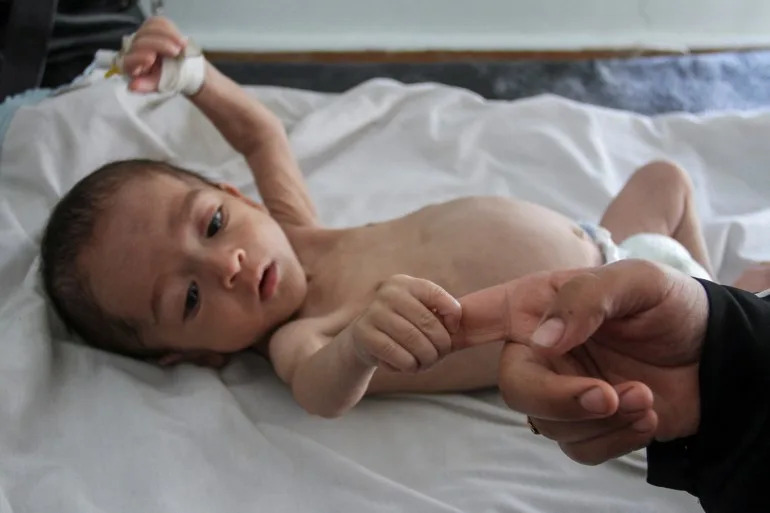World
UN Warns of Catastrophic Hunger Crisis in Gaza Despite Ceasefire

The humanitarian situation in Gaza has reached a critical level, despite a ceasefire that took effect on October 10, 2023. The World Health Organization (WHO) has described the hunger crisis as “catastrophic,” with international aid groups urging Israel to lift restrictions on humanitarian deliveries. The dire conditions persist as supplies entering the region fail to meet the nutritional needs of its residents.
Since the ceasefire, only two crossings into Gaza remain operational, significantly limiting aid. According to the United Nations’ World Food Programme (WFP), the daily target for humanitarian aid is approximately 2,000 tonnes, yet only about 750 metric tonnes are reaching those in need. WHO chief Tedros Adhanom Ghebreyesus emphasized the ongoing severity of the situation, stating, “There is no dent in hunger because there is not enough food.”
Malnutrition and Its Consequences
The effects of the ongoing hunger crisis are alarming. The UN has reported that at least a quarter of Gaza’s population, which includes 11,500 pregnant women, is experiencing starvation. The consequences of malnutrition are likely to extend for generations. In a stark comparison, 70% of newborns in Gaza are now either premature or underweight, a significant increase from 20% before the escalation of conflict in October 2023, according to Andrew Saberton, deputy executive director of the United Nations Population Fund (UNFPA).
Saberton warned that “malnutrition will have generational effects, not on the mother, but on the newborn,” highlighting the long-term implications for the health and development of future generations.
A famine was declared in Gaza City and surrounding areas in August, where over 500,000 people were reported to be in “catastrophic conditions,” according to the Integrated Food Security Phase Classification (IPC). Despite a US-brokered ceasefire aimed at increasing humanitarian aid, the reality on the ground remains grim.
Ongoing Barriers to Aid Delivery
The current restrictions on aid deliveries have drawn criticism from various international organizations. Bahaa Zaqout, director of external relations at the Palestinian NGO PARC, pointed out that while some commercial goods, such as biscuits and soda, have been allowed entry, essential items like seeds and olives are still restricted. He noted, “These do not respond to the minimum nutritional values required for children, women, and the most vulnerable groups.”
The cost of basic food items has skyrocketed, with prices for tomatoes increasing from one shekel to about 15 shekels (approximately $4.50) per kilogram. Forty-one aid organizations, including Oxfam and the Norwegian Refugee Council, have issued an open letter accusing Israel of “arbitrarily” rejecting aid shipments into Gaza. The letter states that between October 10 and 21, 99 requests from international NGOs for aid delivery were denied, along with six requests from UN agencies.
The letter stresses the critical need for unrestricted access to humanitarian aid, listing essential supplies that have been denied by Israeli authorities. These include tents, blankets, food, hygiene kits, and other necessary materials, all of which should be allowed during the ceasefire.
In a recent ruling, the International Court of Justice (ICJ) reaffirmed that Israel has an obligation to meet the “basic needs” of the population in Gaza. Previous accusations against Israel for violating international law by blocking aid deliveries between March and May have intensified calls for increased access to humanitarian assistance.
As humanitarian organizations prepare to scale up their efforts, they stress that what is needed now is access. “Supplies are packaged, staff are equipped and ready to respond at scale,” they stated in their open letter. “Israeli authorities must uphold their obligations under international humanitarian law and the terms of the ceasefire agreement.”
The ongoing conflict has resulted in significant loss of life, with Palestinian health authorities reporting at least 68,280 deaths and over 170,375 injuries since the beginning of hostilities in October 2023. The escalating humanitarian crisis in Gaza underscores the urgent need for a sustainable solution to ensure the safety and well-being of its residents.
-

 Politics1 week ago
Politics1 week agoDallin H. Oaks Assumes Leadership of Latter-day Saints Church
-

 Sports1 week ago
Sports1 week agoSteve Kerr Supports Jonathan Kuminga After Ejection in Preseason Game
-

 Lifestyle1 week ago
Lifestyle1 week agoDua Lipa Celebrates Passing GCSE Spanish During World Tour
-

 Business1 week ago
Business1 week agoTyler Technologies Set to Reveal Q3 2025 Earnings on October 22
-

 Entertainment1 week ago
Entertainment1 week agoZoe Saldana Advocates for James Cameron’s Avatar Documentary
-

 World1 week ago
World1 week agoD’Angelo, Iconic R&B Singer, Dies at 51 After Cancer Battle
-

 Health1 week ago
Health1 week agoRichard Feldman Urges Ban on Menthol in Cigarettes and Vapes
-

 Health1 week ago
Health1 week agoCommunity Unites for Seventh Annual Mental Health Awareness Walk
-

 Business1 week ago
Business1 week agoMega Millions Jackpot Reaches $600 Million Ahead of Drawings
-

 Science1 week ago
Science1 week agoChicago’s Viral ‘Rat Hole’ Likely Created by Squirrel, Study Reveals
-

 Lifestyle1 week ago
Lifestyle1 week agoKelsea Ballerini Launches ‘Burn the Baggage’ Candle with Ranger Station
-

 Business1 week ago
Business1 week agoMLB Qualifying Offer Jumps to $22.02 Million for 2024









